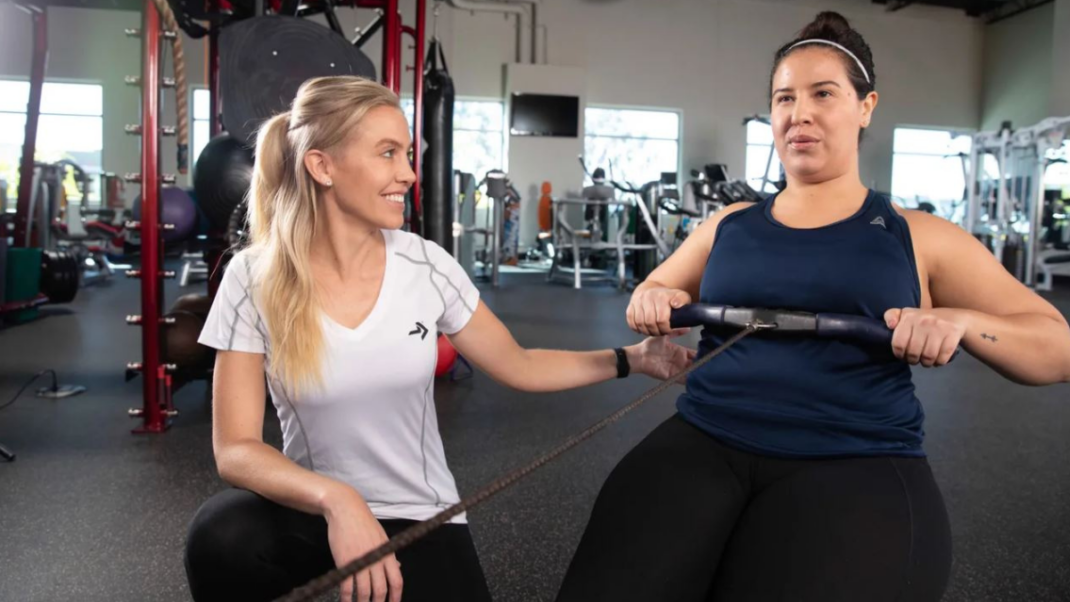IDEA Personal Trainer Institute™
The conference and attendees reflected a maturing profession with much promise.
For the past few years there’s been a lot of conversation in the personal training industry about considering the “whole” client in program design. From the client’s feet to the top of his head physically; to what goes into his body for nutrition; to how his psyche is fed, nurtured and motivated—they all combine for a potent equation of holistic wellness. Throw in corrective-exercise concepts, wellness coaching and excellent management abilities, and that, my friends, is a tall order of skills for any personal trainer to amass—all while doing your best to Inspire the World to Fitness®.
Yet, it’s happening before our eyes: the profession is maturing, gathering momentum and gaining credibility. Proof of this materialized in the body of IDEA’s retooled personal fitness trainer (PFT) event, IDEA Personal Trainer Institute, which unfolded October 11–14 in Orlando, Florida, at Walt Disney World® Contemporary Resort. Approximately 350 attendees, faculty and assistants made the trek to the balmy shores of Lake Buena Vista to participate in this 3-day, hands-on fitness conference (plus 1 day of preconference sessions) packed with carefully planned, in-depth, provocative education.
“I absolutely loved the conference—everything about it,” beamed Joan M. Pringle, MHP, sole practitioner of Take Shape!, an in-home training business in Tulsa, Oklahoma. “I beg you to repeat the kind of conference you held in Orlando: smaller, longer sessions; meals provided. I would be willing to pay more for the smaller group and for the extended sessions. Both made the trip so worthwhile.”
The main fitness conference kicked off with a 7:00 AM hosted breakfast (one of five hosted meals during the fitness event). A community of trainers from all over North America—and 42 delegates from countries outside the United States, including Turkey, Kenya and South Africa—assembled and began a weekend full of education, networking and fun as they listened to IDEA Executive Director Kathie Davis’s welcoming remarks and to the expert panel of Nicki Anderson, Todd Durkin, MA, and Chuck Wolf, MS, who discussed their perspectives on the future of our industry.
The three shared their perspectives on growth areas for trainers to watch: further personalization for the one-on-one client; partner and small-group training; Boomer-influenced postrehab and prehab multidisciplinary approaches; boot camps; and “success” coaching, to name a few. The panelists also discussed challenge areas: responding well to growth opportunities, or forcing yourself out of your business comfort zone in order to grow; maintaining great service and the culture of a small facility in the face of growth; learning to be more of a strategist than an opportunist; enhancing business skills; delegating; dealing with competition; and creating systems that are scalable.
The discussion and ensuing questions from the audience set the tone for the cornucopia of opportunity and challenge that lay ahead for PFTs. At the fitness conference, the varied educational program promised practical strategies and tactics that addressed precisely these kinds of issues.
Classes did not disappoint. A useful balance of hardcore corrective exercise, screening techniques, biomechanics, special populations, management, marketing, functional assessment, coaching, myofascial release and Pilates offerings—among many other topics—gave trainers a healthy dose of the menu that well-rounded professionals need in this day and age.
Nearly all the topics on the program were interesting, said Pringle, but she singled out a few of her favorites. “I am a nut for all the stabilization training (Kevin Dunn’s lecture was terrific); Wayne Westcott is someone I could listen to for two straight days—he’s so chock-full of information. The ‘Functional Movement Screen’ was new to me, and I loved it. Douglas Brooks always delivers; Cheryl Soleway’s lecture on posture analysis and more was excellent; the ‘Women’s Issues Research Roundup’ was also new to me, but I found the information and the three presenters to be fantastic. I would be honored to hear any of these fine speakers again. IDEA does a wonderful job recruiting top-notch, cutting-edge fitness professionals to come and share their knowledge in the hope that we will become better trainers and positively influence more people around the globe.”
A few sessions or breakouts touched on issues that PFTs come up against often:
Nutrition and Scope of Practice. Beth Wolfgram, MS, RD, provided some excellent hypothetical case studies to get delegates thinking about whether they’d advise clients or refer them on nutrition matters. She walked the class through each scenario, asking key questions about what trainers can and cannot do: (1) Are you the right health pro to be doing nutrition counseling? (2) Are you within your ethical scope of practice? and (3) Are you within your expertise and skill level? If there’s ever any doubt, it’s likely you’re over the line. Interestingly, trainers in the room were split on several of the examples, which demonstrates how vast the shades of gray are in this arena.
Attendee and long-time member Donna Baia, founder of Fitness 4 Fun® LLC in Pompton Plains, New Jersey, shared a few thoughts to make the case for stronger nutrition education for PFTs. “In my own experience and opinion, the fitness industry and the general population need greater access to credible nutritional counseling (registered dietitians [RDs]),” she said. “We need to work together to bring awareness to the public of the positive effects that a healthy [diet] can make.” Baia suggested that future education fitness conferences include a more intensive, RD-like curriculum for both newcomer and veteran PFTs. In the absence of that, she said, colleagues should align with RDs in their communities to make client education and referral a simple, intuitive act.
How Much Do You Charge? Anderson, Darren Jacobson and Tony Tamules formed a lively panel for a discussion on pricing training services. It’s no secret that many trainers struggle with how much to charge and often give themselves the short end of the stick. They wonder about giving away free sessions in packages and, if they’re in management and have trainer employees, how much the split between the house and the trainer should be—or if a flat rate is the better solution. The questions were looked at from the vantage points of the panelists’ vast experience and different business models, and the responses provided a well-rounded base to help attendees make sound decisions back at home.
The final word on this topic was to base your pricing not only on what your particular market will bear but also on the perceived value your customer puts on what she is paying for. If you’re priced right and you deliver what the client wants (or exceed that consistently), she will gladly pay what you ask without expecting anything for free. What’s more, you’ll get the referrals that a satisfied customer sends your way.
Physician and Allied Health Referral. Greg Mack, whose business model in Columbus, Ohio, is based on physician referrals, guided delegates on how to approach, establish and nurture excellent relationships with physicians, physical therapists and other allied health pros. The lesson here is to establish yourself as a trusted resource and collaborator among the medical community. Doing this can quite possibly net you more referral business than you can handle. Because insurance pays for just a limited number of sessions with medical and allied health pros, they need credible outlets for their patients to continue safe, intelligent postrehab care.
For more details about this fitness conference, link to the Personal Trainer Institute Daily Blog at www.ideafit.com. You’ll find more on-the-spot reporting there, as well as a complete photo gallery from the fitness event.
The volume has increased from a mere buzz in past years to a consistent hum on the hot button of PFT certification standards, licensure and/or a national board exam for consistency in PFT education.
Near the end of the breakfast panel on the opening day, a delegate came straight to the point: “There are 144 PFT certifications or more out there today. This has shot us in the foot as a profession as far as credibility with outside disciplines is concerned. What are we going to do about this?”
Without nearly enough time to open this discussion or to review what’s happened to date with various agencies and their status in the accreditation process, the panelists did their best to field the issue.
- Nicki Anderson, owner of Reality Fitness in Naperville, Illinois, surmised that within the next 5 years, professionals will probably need a college degree to be a PFT.
- Todd Durkin, MA, said that while he certainly looks for proper credentialing among the trainers he employs at Fitness Quest 10 in San Diego, it isn’t the be all and end all for him in hiring decisions. “We look for a degree plus certification from one of the major organizations, but that doesn’t mean the person is ready to go and train. They need people skills, too, which you can’t teach or prepare for through certification. If they lack the passion for the job or don’t work well with people, I’m not interested,” he said.
- Chuck Wolf, MS, of Human Motion Associates in Orlando, concurred with Durkin, saying that a handful of the major certifications pass muster with him, but if people skills are lacking in potential employees, forget it.
The session ended, but the conversation spilled into the hallways and sparked many a satellite exchange:
“We need to go beyond accreditation—there need to be more practical hours required (or at least a degree in the field),” said Amanda Sommer, a trainer at Almance Country Club in Burlington, North Carolina. She pointed out that reputable Pilates and yoga programs require 200-plus hours of practical time and emphasized that the same should apply to personal training. “There are too many people who complete a weekend cert or whose ‘practical’ knowledge is coming from someone who has no formal education or training. It’s also more incentive for facility owners to hire qualified staff.”
Establishing a national licensure process will make the industry more accountable and respected, said Matthew Sommer, MS, personal training director at Alamance Country Club, who attended with spouse Amanda. “I think the accreditation process has gotten ridiculous and that a licensure/registry needs to be implemented to eliminate PFTs who are not committed to the field (getting the appropriate education, practical skills, communication skills, accounting skills, cuing, risk factor stratification). Licensure would also make the reimbursement process with insurance companies easier. On that note, we need to press insurance companies to cover personal training as a measure to prevent and treat obesity.”
Joan M. Pringle of Tulsa, Oklahoma, would like to see stricter certification requirements for the mere purpose of preserving the credibility of a profession about which she cares deeply. “We need to ‘weed out’ the ignorant and crummy trainers out there. They give us a bad name,” she concluded.
What are your thoughts on the matter? Share your view to us at [email protected].
Sandy Todd Webster is the editor in chief for IDEA’s publications.





